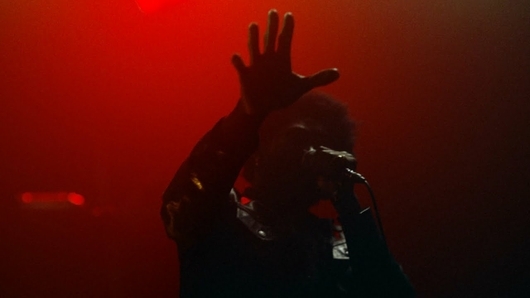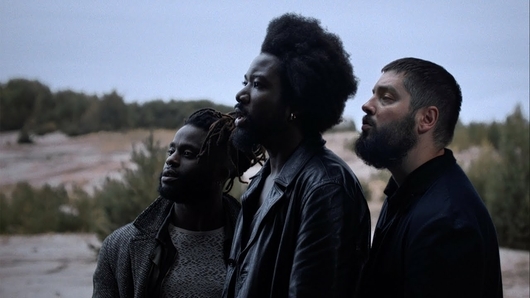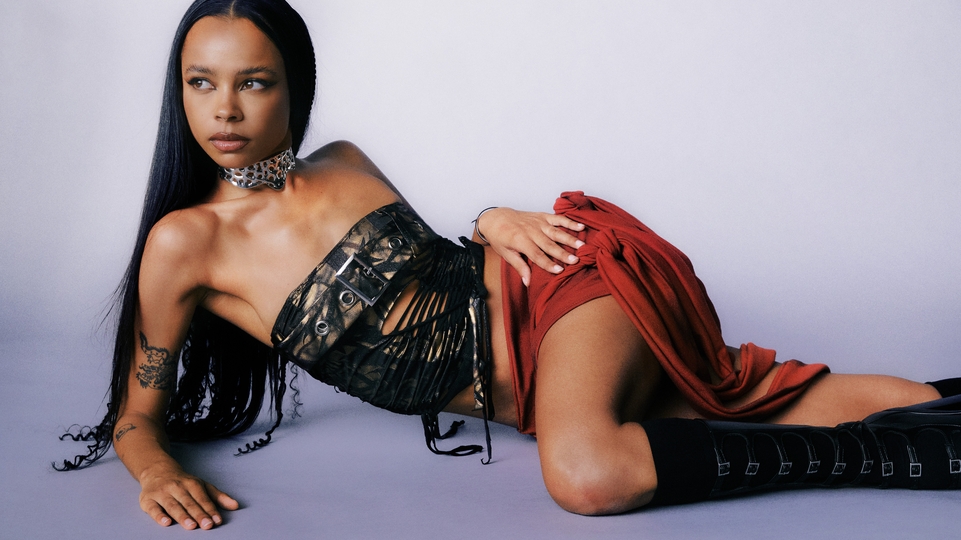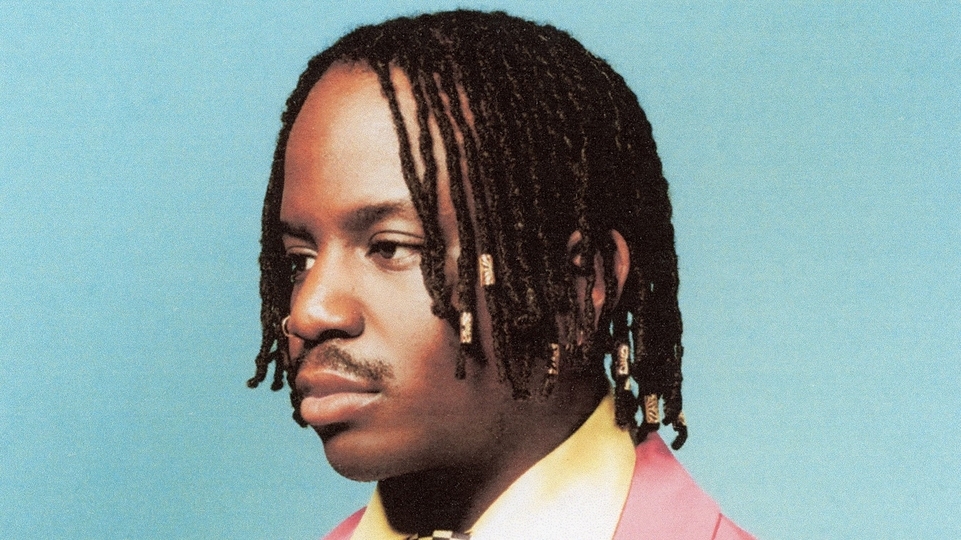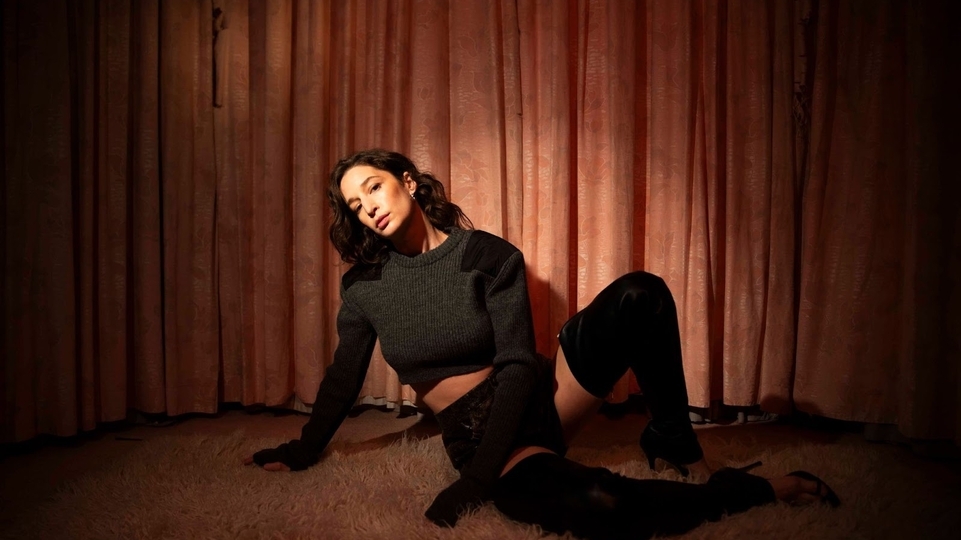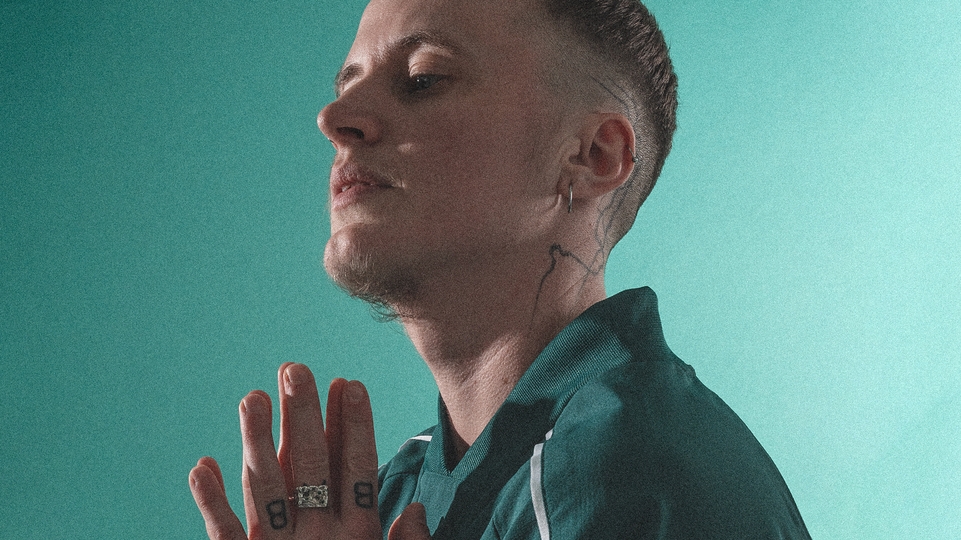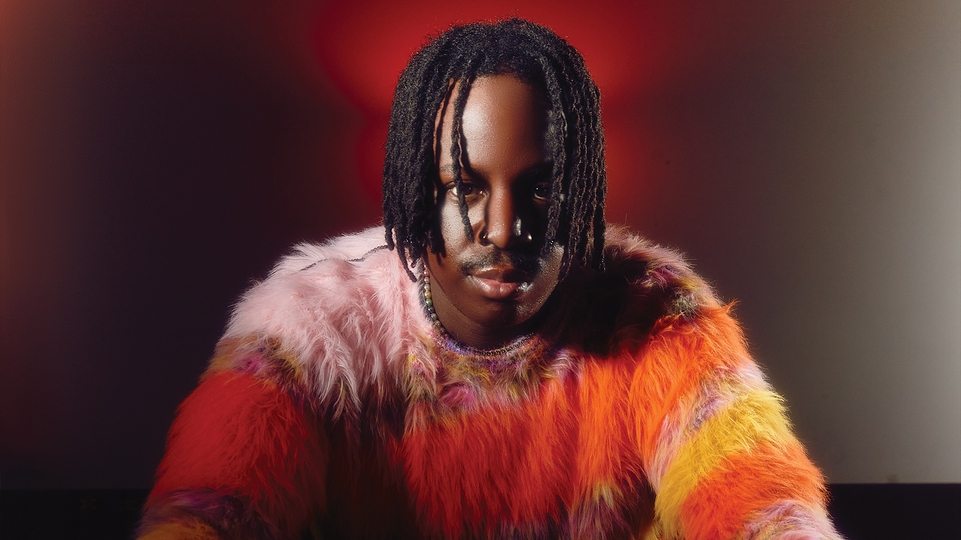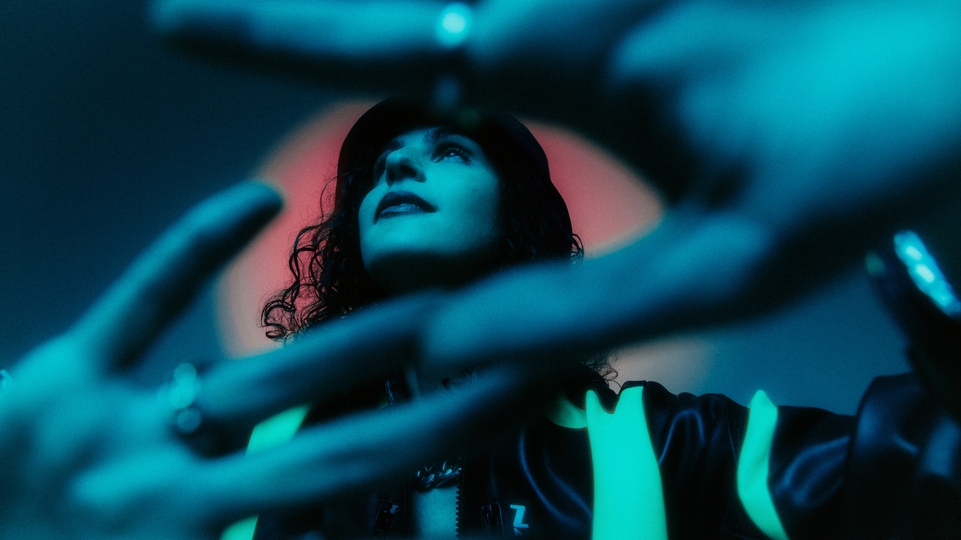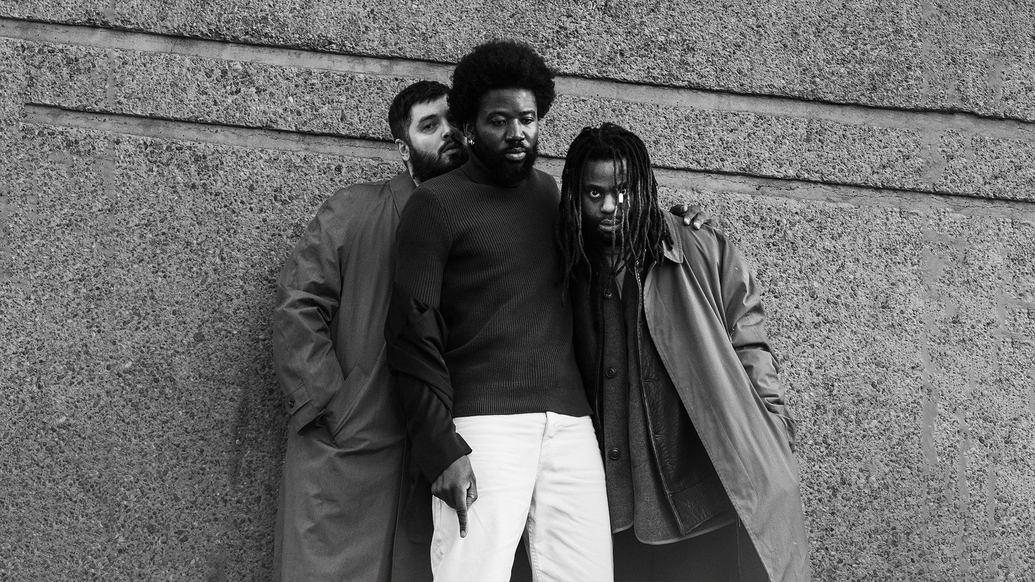
Young Fathers’ uncompromising vision
A decade on from their Mercury-winning debut, Young Fathers were nominated again this year for 'Heavy Heavy’ on Ninja Tune . Neil Kulkarni meets the Edinburgh outfit to get a grip on their fierce sound, their recording processes, and why they don’t get played on BBC Radio 1
What shocked you the most when you first saw Young Fathers’ Glastonbury performance, whether you were there or just catching it on TV? Was it the fact that towards the end of the set Graham ‘G’ Hastings — who together with Alloysious ‘Ally’ Massaquoi and Kayus Bankole makes up the Scottish future-pop three-piece — snarled into the mic: “Glastonbury, we are Young Fathers, I want to try something”, before leading a chant of “Say it loud, say it clear, Refugees are welcome here”? Was it the moment straight after that when G added “Fuck the Tories” (live on the BBC no less) before announcing the track ‘Shame’ with the unforgettable prefix, “This one’s for Suella”?
Was it the fact that in a supposedly counter-cultural weekend, Young Fathers were virtually the only band to make TV coverage apparently speaking out about this appalling government’s appalling treatment of migrants? Or was it, as it was for this writer, the fact that this wasn’t delivered in the midst of yet another set of retrograde rock or anodyne pop, but in the white-hot midst of a set of music that seemed to genuinely posit a future, a set of songs that seemed perfectly apposite for those sentiments? Because in the actual nuts and bolts of Young Fathers’ sound you can hear the divisions and barriers so often erected in contemporary music being erased, confounded, destroyed.
Through their early albums on underground hip-hop labels like Big Dada and Anticon, to their Mercury award-winning breakthrough set ‘Dead’ in 2014, and the subsequent astonishing records all the way through to this year’s ‘Heavy Heavy’ (all on Ninja Tune), this is truly a band that walk it like they talk it, with music that is a living embodiment of the kind of openness, hope and pluralism that so many conservative forces — both within and outside music — are trying to shut down. And that’s why for so many of us, Young Fathers are starting to feel like the only band that matters anymore. They’re about to hit the road on their biggest tour yet, after festival- spots like Glastonbury and support slots with the likes of Depeche Mode that have introduced them to a whole new rapt audience. And, of course, they’re not entirely comfortable about being... liked.
“For us, what’s going to be strange is going out on tour and actually having an audience who... like us,” grins Ally. “Sometimes if one of us isn’t feeling it, or the audience is hostile, they can actually be the best shows. People react to us because it’s a human thing and not slick; there’s no protection for us in doing the typical rock & roll things, and for us any kind of reaction is a positive because it’s never, ‘Oh well, I’ll just go get another beer’.
“We’ve never looked at other bands or shows and thought, ‘Ahh, we need to be like this or that,” he continues. “We trust ourselves based purely on whether we can lift our heads, look at people and perform. Whether or not an audience is on our side doesn’t matter. I like a bit of a standoff — that tension. We were supporting Paul Weller and there was just this group of guys going, ‘Fuck off fuck off fuck off’ through our whole set. I loved that, that they were so angry we were up there.”
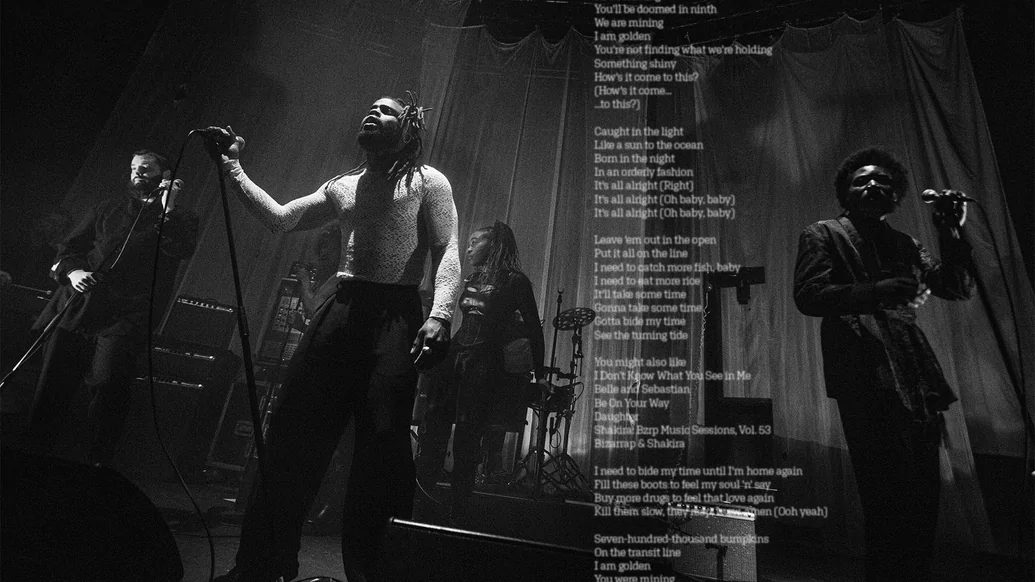
Young Fathers actually seem to enjoy the interview process. They seem to see it as a part of what they do, just like recording and playing live — way beyond mere promotion. They see it crucially as part of the process of figuring themselves out. “We don’t really sit and have big in-depth conversations about what we’re going to do,” admits G. “We only realise our process after it’s happened, so interviews are good because they enable us to realise things about ourselves.” We end up talking for well over an hour, and DJ Mag still has a tonne of questions left. When we ask them exactly how their latest masterpiece, the fabulous febrile bodyslam of this year’s ‘Heavy Heavy’ LP came together, it’s clear that they are a band who go about music-making in a way unlike anyone else.
“We took time off, we assigned a block of time to record, we got in a room together in a safe scenario where everything was to hand, and we abandoned ourselves to it. We never listen back to anything until we get to the point where we feel in our gut that we might have something,” says G. And your hack is stunned. That’s mad. You didn’t listen back? How did you resist that temptation? “We only listened back when we all instinctively felt it,” nods Kayus. “You have to be confident enough to just let things happen, then leave it, and come back to it in the most objective way we can, as listeners rather than people who made the music. And that’s when you realise, we might have something here. We recorded 41 tracks for this album! As listeners, we are brutal.”
“We’ve been together for so long,” says Ally, “and we’ve recorded every other different kind of way that you can record: taken ages, worked quickly, worked in big studios, worked in our bedrooms. This time we really honed in on our strongest way to work, and that’s working fast and not listening. It stops you being precious, ’cause when it comes to that day where you feel in your gut, ‘Hey, maybe we’ve got enough’, and you listen back, it’s the closest you can get to being an outsider to this band and to yourself. You forget stuff, things you thought were terrible actually become your favourites. Recording makes you lose perspective on songs; listening returns you to that status of being a pop fan looking for that fix, that thrill. You need that distance, that brutal hour, to decide what’s worth pursuing. You need to feel the power of moments in songs, ’cause that’s what really hits you as a listener. And we totally trust each other as listeners.’’
“Everybody’s got their ideas,” adds Kayus. “Everybody wants to put in their bid. So many ideas right across the board. We sift through that and say, ‘That’s what the song is’. Instinctively, we all get to that place very quickly because it’s for the greater good of the song.” “The best songs are the ones where you say what you need to say, and leave — that’s the best pop song,” says Ally. “You don’t meander off, there’s no fluff. We’re pop boys. We love pop. Pop can be a scream, a grunt, a snare hit. That’s the bit we are always searching for. That’s the bit we trust.”
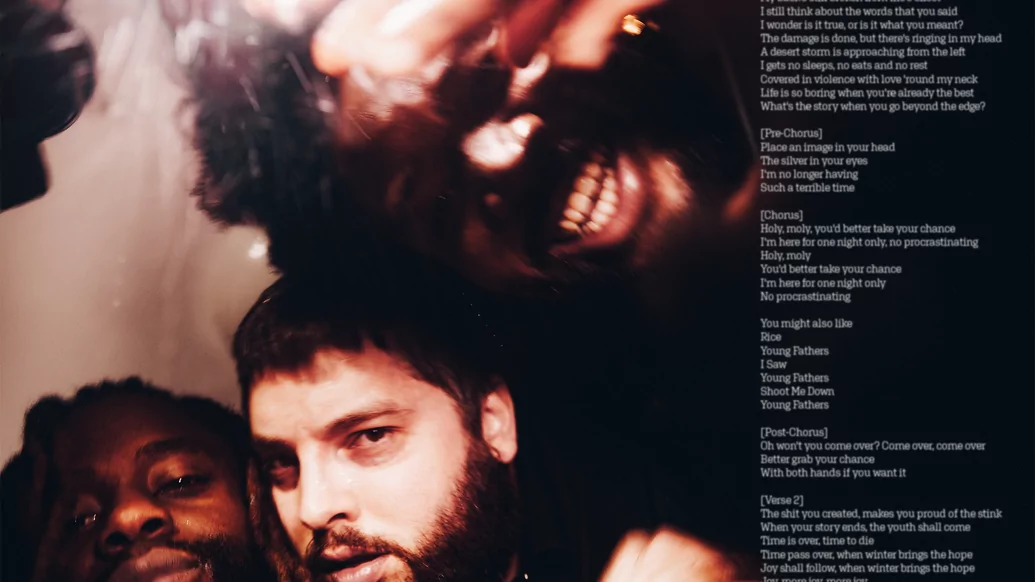
Trust is a word that Young Fathers keep returning to in our chat, a chat peppered with each of the members finishing each other’s thoughts and sentences, revealing the long and close friendship they’ve shared and how that feeds into the Young Fathers process. “Because we know each other, we know that what we love is capturing the accidental — that’s where the magic happens,” says Ally. “When you spend too much time on something you end up diluting, losing a feeling. The way Young Fathers make music is like the way in Ghostbusters when they throw a ghost-trap down. We get things to a point where everything is sucked in and then we close it. Trap it. Trap that feeling, that moment.”
‘Heavy Heavy’ is full of moments that tear your head off, that make you wonder why no one else is making music simultaneously this free and this peppered with massive unforgettable hooks in 2023. Talking about the genres that feed into Young Fathers sound is difficult because their's is an entirely unique and fluid new meld of a lifetime of careful listening that’s clearly ranged across hemispheres, timezones and all cultural boundaries. Crucially, ‘Heavy Heavy’ sounds stadium-sized, field-sized, but seems to build itself from tiny solitary moments of revelation about community, about self, about togetherness.
DJ Mag wonders if the lockdown-enforced five-year gap between 2018’s incredible ‘Cocoa Sugar’ and the new Mercury-nominated LP itself enforced a new need and impetus in their music. “For us, that sense of being able to be together, to be free voices together again, this communality and togetherness — all those themes popped up through that process,” says G. “You go in not thinking anything apart from let’s see what happens. None of us come to this like singer-songwriters — here’s some chords and my words. I think people do that to feel confident. We have the confidence to come with nothing, and so long as there’s a microphone nearby and some way of recording it then we are confident. And that doesn’t stem from ‘bravery’, it stems from being at a point of being totally free and forward with each other because we’ve known each other for years.”
“Which means we can lean on each other,” nods Alloy. “We can come with nothing and know someone will have a spark, and that we all want to do something that we’ve never done before. We’re always chasing a druggie kind of feeling, when you create something new and you can’t believe you were part of it. We’re not a band whose music is based on planning; it’s based on spontaneity, first takes — we change and morph but the fundamental thing that excites us is asking ourselves: can we surprise ourself?”
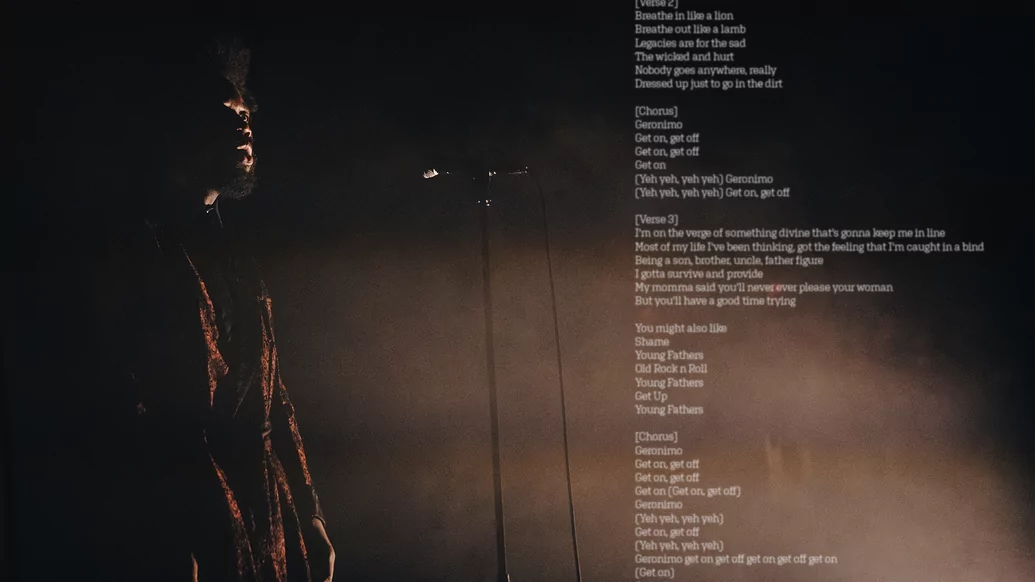
If Young Fathers’ unique sound has suffered from unfair marginalisation over the years, it’s down to the fact that this is a working class, multi-racial band whose music simply refuses the audience-underestimation and demographic-focused idiocy of so much modern music marketing. This writer first heard Young Fathers back in 2011 on their debut mixtape ‘Tape 1’ on Big Dada. That, and its 2013 follow-up ‘Tape II’ on Anticon, were miraculous records that I mentally tried (but couldn’t quite) crowbar into calling hip-hop. The band came together after meeting as teenagers at Edinburgh’s underage Lick Shot hip-hop nights — nights that they felt isolated from, nights that spurred them to start working together and realising that they all loved pop first and foremost.
The clear diversity of sources in those early records — everything from Nigerian hi-life to Suicide-style noise to Miles-style jazz funk — seemed less to be about attempting to emulate what was canonical and more about tapping into that spirit of shock and uniqueness those sources had. If Young Fathers ever were hip-hop, it’s only in the sense that they shared early hip-hop’s spirit of using everything to sound like nothing else, and their music has remained totally free of the usual egoism that has since come to dominate both rap and rock & roll. They are a strangely old-skool proposition that happen to make some of the most forward-looking music on Earth.
“Ego has to be part of it, of course,” warns Ally. “The world affects you, your situation affects you and the new record can’t help but reflect that, reflect what’s going on in the zeitgeist, you know? We have been making music since we were 13/14-year-olds, so we can bring things we want to get off our chest to our music. But crucially, we operate from a place of feeling rather than thinking when it comes to music. “Since we started making tapes, we’ve soaked up everything we listen to, watch, read, experience, and bring it to Young Fathers,” Ally continues. “That involves ego, but also trusting each other to deconstruct, manipulate and bring light to each other’s ideas, different perspectives that open up reflections on ourselves that nothing else can. We all have to surrender to that. We don’t agree on everything. We argue a lot. But the one thing that always pulls us together is the song.”
“The way we met was under a backdrop of hip-hop, dancehall and R&B, which were all deeply hook-laden music,” says Kayus. “I think ‘hooks’ is probably a better way of describing our music than pop, and because we love hooks, of course the underground hip-hop scene didn’t quite know what to make of us. To achieve magic within the constraints of pop music — that’s been our goal for nearly 20 years now, on records and live. Keeping this energy from flatline to ramped up all the way through, to never let us or the audience get bored. Get to the source, hone in on those mistakes that reflect us, that’s Young Fathers’ DNA. And playing things live is the final part of the process.”
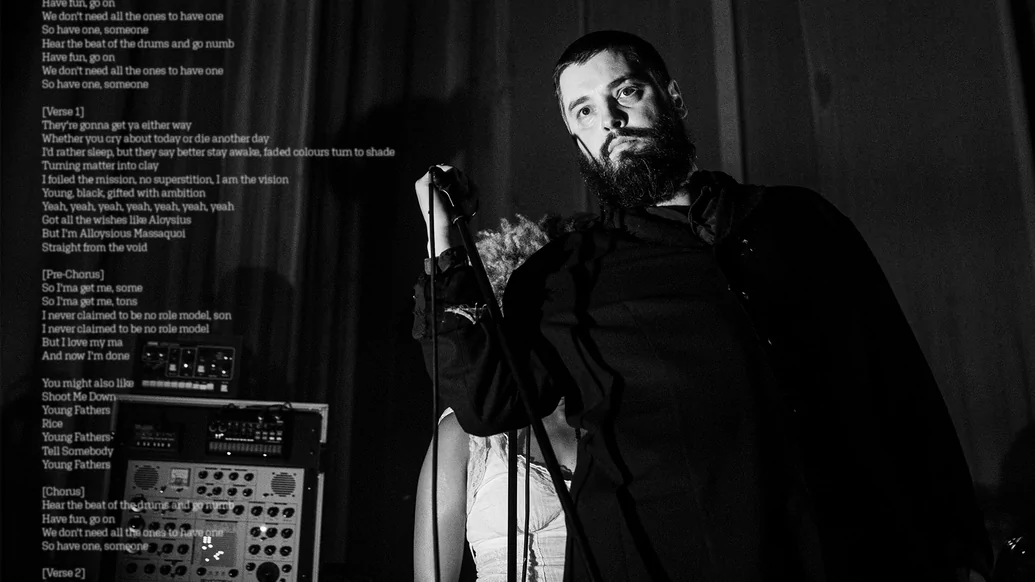
“It’s transformative,” nods Ally. “Pop is an addiction to moments like James Brown’s scream, these tiny moments in a sequence — that’s the dream, to achieve that.” 2014’s ‘Dead’, their debut full- length LP, pushed Young Fathers to prominence thanks to it winning that year’s Mercury Prize; the trio picked up flak for not smiling during the awards ceremony, but for the band, the purpose and point of appearing was always clear — less about picking up a trinket and glad-handing, far more about creating the chance for the pop chaos they’d grown up loving.
“For us, the whole point of that was it was an opportunity to play live on TV,” says Ally. “We know the agenda of most of the music media; we wanted people to see that this kind of music exists, that we’re sure of ourselves, and for someone at home, anyone, to be like, ‘Wow!’ Those are the moments we remember from our youth — band appearances on TV that just shifted the world sideways for a moment. So no, we didn’t smile. We were more like, thank you for giving us a space, let us do what we do, show people that you don’t have to make the ‘right’ music, or do things a certain way. This music exists, it’s magic. Now fuck off.”
Why aren’t you played on Radio 1? The band crease into chuckles. “You wanna hear some of the ‘feedback’ we’ve had from those people?” asks Ally. “In the UK everything is funnelled through this system that stymies creativity. We’ve had conversations with radio programmers who have explicitly said, ‘Oh, the sonics of this won’t work for the show’, or ‘This distortion is too much’. That’s what we’re fighting against. We’re not just three white guys with guitars, but we’re also not welcome at 1Xtra. People are so scared of upsetting anyone that even on the internet now — although supposedly full of diversity — they’re still trying to create some kind of separation between young people in playlists, in things that are so genre-specific. The ‘creative industries’ always talk about ‘thinking outside the box’, about how being unorthodox will get you heard. But they don’t mean it! Our working class background means we have to continue, ’cause the alternative is getting a job! But it’s a constant struggle.”
It seems like it’s one that Young Fathers are still up for, though: “We’re tired with that particular fight, but our purpose now with every record is to get to make the next record.” It’s going to be enthralling. If you don’t know, get to know immediately. Stars in a just universe. Watch them shine.
